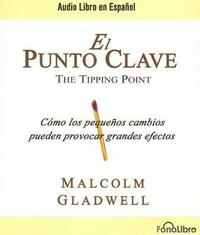You need to sign in or sign up before continuing.
Take a photo of a barcode or cover
Had a lot of interesting ideas in it and real life examples.
informative
reflective
fast-paced
hopeful
informative
reflective
medium-paced
I have heard many people refer to Gladwell over the last couple of years, so when my book club selected Outliers for our upcoming Feb 2011 meeting, I decided to just start at the beginning and read The Tipping Point first (and Blink next). Gladwell does a good job popularizing principles from sociology, economics, psychology and statistics to bring some remarkable observations to the lay reader. My background is in the humanities, but I found that Gladwell is good at making these principles accessible through anecdotes and metaphors. The only time my mind wandered was his second extended case study, the one that focused on smoking. I did enjoy how he used Paul Revere's ride as an example of a Connector of a Salesman and of the stickiness factor. Not only did I get his point, I felt as though I learned a bit more about American history as a bonus.
In addition to finding his style accessible and entertaining, Gladwell makes an interesting point in the nature-nuture debate, which I didn't see clearly until his conclusion. When all the dust settles, it's clear that Gladwell takes the "nuture" side. This would be a welcome message to business folk, educators and politicians who want to believe that they can motivate people by changing externals. I'm not sure that I agree with him that Bernard Goetz was just responding to his environment and that any other person would follow the same path to vigilante justice, but Gladwell makes his point clearly with abundant examples to shore up the principles attached to this claim.
In his conclusion, I found this very apt passage that summarizes his argument:
"We like to think of ourselves as autonomous and inner-directed, that who we aer and how we act is something permanently set by our genes and our temperament. But if you add up the examples of Salesmen and Connectors, of Paul Revere's ride and Blue's Clues, and the Rule of 150 and the New York subway cleanup and the Fundamental Attribution Error, they amount to a very different conclusion about what it means to be human. We are actually powerfully influenced by our surroundings, our immediate context, and the personalities of those around us" (258-9).
Even if I don't accept completely his stance on nature vs. nurture, I am walking away with new-found recognition and respect for Connectors, Mavens and Salesmen. I will no more feel slighted to have a "weak" connection with people, knowing that change happens when we step out of our circle of intimate. I will also better understnad why work situations and church congregations function better near the 150 mark, thanks to his passage on the Rule of 150. I even changed an announcement of a book club meeting to make it more interactive, thanks to his discussion of the success a Columbia Record ad exec had by asking his potential customers to look for the golden box. You too might find some compelling lessons in the supporting examples.
In addition to finding his style accessible and entertaining, Gladwell makes an interesting point in the nature-nuture debate, which I didn't see clearly until his conclusion. When all the dust settles, it's clear that Gladwell takes the "nuture" side. This would be a welcome message to business folk, educators and politicians who want to believe that they can motivate people by changing externals. I'm not sure that I agree with him that Bernard Goetz was just responding to his environment and that any other person would follow the same path to vigilante justice, but Gladwell makes his point clearly with abundant examples to shore up the principles attached to this claim.
In his conclusion, I found this very apt passage that summarizes his argument:
"We like to think of ourselves as autonomous and inner-directed, that who we aer and how we act is something permanently set by our genes and our temperament. But if you add up the examples of Salesmen and Connectors, of Paul Revere's ride and Blue's Clues, and the Rule of 150 and the New York subway cleanup and the Fundamental Attribution Error, they amount to a very different conclusion about what it means to be human. We are actually powerfully influenced by our surroundings, our immediate context, and the personalities of those around us" (258-9).
Even if I don't accept completely his stance on nature vs. nurture, I am walking away with new-found recognition and respect for Connectors, Mavens and Salesmen. I will no more feel slighted to have a "weak" connection with people, knowing that change happens when we step out of our circle of intimate. I will also better understnad why work situations and church congregations function better near the 150 mark, thanks to his passage on the Rule of 150. I even changed an announcement of a book club meeting to make it more interactive, thanks to his discussion of the success a Columbia Record ad exec had by asking his potential customers to look for the golden box. You too might find some compelling lessons in the supporting examples.
informative
fast-paced
adventurous
challenging
funny
informative
medium-paced
Extremely hard to follow. Brain map and names make no sense.
informative
informative
medium-paced
informative
medium-paced
Gladwell is one of my favorite nonfiction authors because he is short and to the point.



